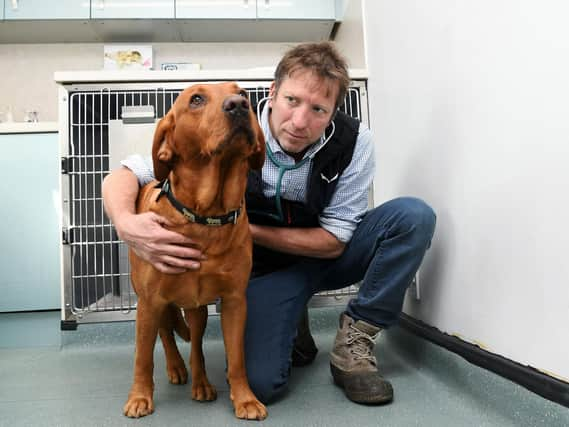The Yorkshire Vet Julian Norton has coronavirus on his mind after spending a day getting blood samples from sheep


Others have been screening tests, where a large population of healthy, asymptomatic animals are sampled to check for the occult presence of disease within that population.
This week’s case was a flock of beautiful pedigree sheep. The test was useful for the sheep but, arguably, not the best use of a pathology lab’s time, given the current circumstances.
Advertisement
Hide AdAdvertisement
Hide AdThere were just over 100 sheep to sample, which I expected would be a morning’s work, although I’ve learnt from experience that, even for an expert sampler, things can go horribly wrong.
There is a knack to blood sampling sheep, because they are covered in thick wool and resistant to standing still and the task can send an inexperienced vet into panic. I once went to rescue a tearful junior colleague who, after four hours and with a growing pile of spoiled tubes and bent needles, had managed to test only a handful of ewes.
But I learnt the skill in my first job in the north of Scotland, where we’d test hundreds of sheep to ensure they were free of a disease called Enzootic Abortion, so I got quite good. It’s a pleasant job, even though the thighs burn after a few hours of the repetitive squats required to sample every animal.
The Suffolks were behaving impeccably and everything was progressing smoothly, until one boisterous shearling took off, clearing the gate and landing on the table where my equipment was arranged, scattering tubes and paperwork everywhere. The farmer’s phone, which was also on the table, landed in a bucket of water with a plop.
Advertisement
Hide AdAdvertisement
Hide AdLuckily, since blood tubes are now plastic rather than glass, and since the phone was in an excellent waterproof case, the accident was not as catastrophic as it might have been. As we got towards the last few in the group, the farmer announced, “Right, there’s some more ewes at the other farm.” These were not the words I wanted to hear just before lunch, when I thought I’d finished.
On the other farm, the sheep were grazing happily in the field. I watched as the farmer summoned two hapless looking collies to help bring them in. Shouts of “come by,” were quickly followed by “come back,” but eventually the sheep were in one place and the final blood samples were collected.
On the way home, listening to the radio reports about the woeful statistics and false hope of Covid testing, I pondered the expected results for the sheep. Mass testing should reveal the population of healthy sheep to be clear. But not all tests are 100 per cent accurate, with potential for false positives and false negatives, which is a big problem for large-scale population screening.
A good screening test should pick up all possible cases, including those that are pre-clinical or asymptomatic, but runs the real risk of giving false positive results. Even with a sensitivity of 99 per cent, out of 10 million “moon shot” Covid tests, for example, there could be 100,000 false positive results, with goodness knows what lockdown consequences.
Advertisement
Hide AdAdvertisement
Hide AdAlmost as bad are the false negatives, where a false sense of security is given to a carrier.
I parcelled up my own blood tubes securely in polystyrene boxes and labelled them clearly as “biological samples”, hoping for everyone’s sake there would be no positive results, true or false.
------------------------
Support The Yorkshire Post and become a subscriber today.
Your subscription will help us to continue to bring quality news to the people of Yorkshire. In return, you'll see fewer ads on site, get free access to our app and receive exclusive members-only offers.
So, please - if you can - pay for our work. Just £5 per month is the starting point. If you think that which we are trying to achieve is worth more, you can pay us what you think we are worth. By doing so, you will be investing in something that is becoming increasingly rare. Independent journalism that cares less about right and left and more about right and wrong. Journalism you can trust.
Thank you
James Mitchinson
Comment Guidelines
National World encourages reader discussion on our stories. User feedback, insights and back-and-forth exchanges add a rich layer of context to reporting. Please review our Community Guidelines before commenting.